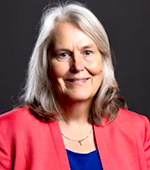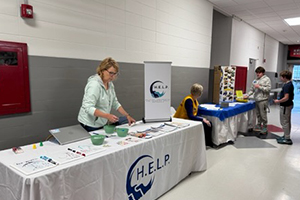Improving Together
By Jessica Rosencrans on
Mental illness is a growing concern across the U.S., and rural communities are no different. According to the Substance Abuse and Mental Health Services Administration's report Key Substance Use and Mental Health Indicators in the United States: Results from the 2024 National Survey on Drug Use and Health, trends in suicidal thoughts and behaviors have been increasing among adolescents, with 2.6 million adolescents aged 12 to 17 (10.1%) having serious thoughts of suicide in the past year.
Rural facilities are hardly taking the issue lying down.
To help prevent behavioral health crises and improve education in rural communities, the North Dakota Medicare Rural Hospital Flexibility Grant (Flex) Program has partnered with Rural Health Innovations and is supporting four North Dakota Critical Access Hospitals (CAHs) to take part in the North Dakota Behavioral Health Cohort.

This three-year virtual cohort has allowed CAHs in different corners of the state to come together and share ideas on how to address behavioral health concerns in their communities. Throughout the process, the cohort is guided by Debra Laine, lead program specialist, and Precious Fritz, program specialist I, at Rural Health Innovations. Laine and Fritz walked each facility through an assessment to determine their strengths and weaknesses and facilitate discussion among the group to share ideas on how to improve.
"Behavioral health is a broad subject," Laine explained. "We really look at the data behind an intended population and how each facility can make an impact in that area. It's very individualized, we want to find an attainable solution."
Based on their assessment results, the four CAHs participating in the cohort, CHI St. Alexius Health Carrington, Jacobson Memorial Hospital in Elgin, McKenzie Health in Watford City, and SMP Health – St. Aloisius in Harvey, all identified unique concerns in their community and drew up a plan to help alleviate them. The resulting community projects all had the goal of addressing a specific population, but most importantly had to be achievable.
Establishing Community Projects
 For its project, CHI St. Alexius
Health Carrington chose to focus on its Mental Health
Fair, hosted annually in May to align with Mental Health
Awareness Month. The first fair was held in 2024 with 100
attendees and 10 information booths. One year later, they
saw nearly a doubling in participation: 150 attendees and
18 information booths.
For its project, CHI St. Alexius
Health Carrington chose to focus on its Mental Health
Fair, hosted annually in May to align with Mental Health
Awareness Month. The first fair was held in 2024 with 100
attendees and 10 information booths. One year later, they
saw nearly a doubling in participation: 150 attendees and
18 information booths.
"We've seen a number of successes related to our efforts in mental and behavioral health education," said Taylor Sabinash-Bauer, foundation coordinator and community liaison at CHI St. Alexius Health Carrington. "Our most significant achievement to date has been the noticeable increase in mental health awareness in our tight-knit community."
Our most significant achievement to date has been the noticeable increase in mental health awareness in our tight-knit community.
McKenzie Health in Watford City has been taking a different approach. It has been modeling an approach that will expand case management services through a Behavioral Health Initiative program.
"Our goal is to bridge the gap between a patient's medical care and a lack of consistent mental health services in our area," said Sharalyn Johns, outpatient social worker at McKenzie Health. "This program allows us to support patients holistically by addressing both their behavioral health and social needs."
Jacobson Memorial Hospital is working with the five schools in its service area to promote behavioral health education, aiming to reduce stigma. It is also looking to educate teachers and youth pastors who work closely with students to establish a first line of support in an effort to prevent adolescents from experiencing a mental or behavioral health crisis. SMP Health – St. Aloisius's project is aimed at increasing the percentage of outpatients who receive mental health screenings.
Achieving More With Collaboration
Likewise, the North Dakota Flex Program aims to support collaboration between healthcare facilities, strengthening the CAHs and improving access and quality of care in the state.

"Behavioral health is a critical component of overall well-being in rural communities, where access to care is often limited," said Anahita Anvari-Clark, clinical project coordinator with the North Dakota Flex Program, "and stigma or limited understanding of behavioral health needs can prevent people from seeking needed services. We are proud to support this initiative as it equips our CAH cohort with tools and strategies to strengthen behavioral health services for those who need them most."
The structure of the cohort is separated into three distinct sections: internal assessment, identifying and recruiting community partners, and sustainability. As the CAHs to enter into the second year of the cohort, they are beginning to look into their respective communities for partners that can help them work towards their goals.
"The Carrington Area Healthy Communities Coalition has been a crucial partner, assisting our project by securing funding for activities related to the Mental Health Fair. Beyond financial support, they have also been instrumental in brainstorming innovative ideas and strategies for the fair's development," Sabinash-Bauer and CHI St. Alexius Health President, Jodi Hovdenes gratefully affirmed.
They also shared appreciation for the support coming from inside CHI St. Alexius Health's walls. In particular, Amber Kruse, clinical informaticist, has played a key role in organizing events and meetings to ensure the project is successful.
We have been blessed to have many strong partners in our community.
"We have been blessed to have many strong partners in our community," Sabinash-Bauer expressed.
Connections within the cohort between the CAHs have also helped to strengthen community programs. Facilities can share what efforts they have tried in the past, both successes and failures, so others can take away lessons learned without repeating mistakes.
"This initiative has allowed us to move from talking about behavioral health needs to actively addressing them," Johns remarked. "It has opened the door to sustainable change not only within our hospital, but throughout the community as we build awareness and improve access to care."
Overall, demonstrating how small, consistent efforts can make a large impact in a rural community is a key takeaway that Laine and Fritz hope the CAHs gain from their time in the cohort.
"It is so important to me to help these hospitals expand their thinking about how taking a lead in working with the community can really make an impact on the total health of a person," Laine said.
Fritz agreed. "Sometimes it can seem like these small steps won't have an impact, but they can ripple out quickly – especially in a small community."


 is the communication specialist with the Center for Rural
Health at the University of North Dakota School of
Medicine & Health Sciences in Grand Forks.
is the communication specialist with the Center for Rural
Health at the University of North Dakota School of
Medicine & Health Sciences in Grand Forks.



